Journey to Orthodoxy
by Kevin Allen
In this two-part interview originally appearing on Ancient Faith Radio, Kevin Allen of the “Ancient Faith Today” podcast interviewed “George” who became a Sunni Muslim at age fourteen and studied to become an Imam at a madrasa, studying the Quran, Arabic language, Islamic theology, hadith, and jurisprudence. He left Islam and became an Orthodox Christian twenty years later. Among other things, Kevin and his guest discuss Islamic theology, common misunderstandings of Christianity by Muslims, differences between “orthodox” Islam and the Nation of Islam, the true understanding and practice in Islam of slavery and jihad, and the extraordinary journey that led “George” to Orthodox Christianity.
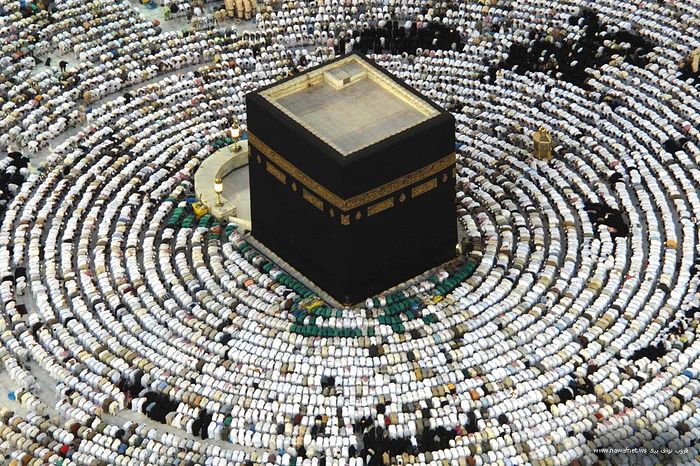
—Welcome and thank you for joining me on this edition of Ancient Faith Today.
There is a lot coming from the media and news about Islam these days. In this two-part series of which this is part one, I will be discussing Islam and the personal experiences of a recent convert to the Eastern Orthodox Church.
My guest converted to Islam at the age of fourteen and twenty years or so later left Islam to become an Eastern Orthodox Christian, and I have communicated with his priest by the way, who’s confirmed his history and that he is in good standing with the Orthodox Church. And my guest, who for purposes of safety we’ll call “George” and will not reveal his location or parish, is a Caucasian American who studied Islamic theology, history, and jurisprudence in an Islamic seminary to become an Imam. He learned the Arabic language and memorized a percentage of the Quran in Arabic. So in this first part of the interview we’ll discuss my guest’s conversion to Islam and some theological and historical facts about Islam through the mind and heart of a convert from Islam to Eastern Orthodox Christianity. George, it is wonderful to welcome you to Ancient Faith Today.
—Thank you very much Kevin. It’s a great blessing to be here.
—As we’ve discussed before the interview, you said you started even in your early teens studying various religions and philosophies.
—Yes I did. I researched some of the eastern spiritual traditions such as Buddhism and Hinduism. I also read a bit of Greek philosophy, in particular the school of Stoicism. I quickly lost interest in both Hinduism and Buddhism though, even as a kid of twelve or thirteen who was pretty open-minded, these two beliefs systems were just a little too out there for me. The polytheistic beliefs of Hinduism and non-theistic beliefs of Buddhism just didn’t feel right to me. I still believed and felt that there is only one God.
—So why was Christianity not even an option or of interest to you?
—I didn’t see any value in the brand of Christianity that was readily available to me. Whether it was the images of the TV evangelists jumping and hollering, telling people that they can buy their way into the Kingdom or the constant hypocrisy and self-righteousness of people I encountered every day. I didn’t see that Christianity had anything to offer me or anyone else for that matter. Then there were the problems I had with Christian theology as I understood it as that time. The Holy Trinity was just too confusing, the Crucifixion and the Western understanding of the atonement, seemed like nothing more than just a scapegoat in order to make people feel better about their own shortcomings and to just let them off the hook, from having to make any effort to change their lives in a profound way.

—What specifically attracted you though to Islam?
—It appeared to offer some absolutes that I was in search of, the discipline. The theology I can more easily wrap my mind around. Historically it didn’t seem to have the baggage of Christianity, such as slavery, racism, bigotry, the Crusades, the Inquisition and the general intolerance that Christians have been accused of throughout the centuries.
Spiritually, it seems to offer a real worship using your voice, your mind, your body, not just waving your arms around in the air and shouting and singing. Then there is the practice in Islam known as “Dhikr” which literally means to remember, to bring to mind. In this practice one just tries to clear their mind of everything but God. Through this practice one recites short prays repeatedly in order to help them try to gain more of a presence of God. But of course the center of worship in Islam is the five daily prayers which are obligatory in Islam.
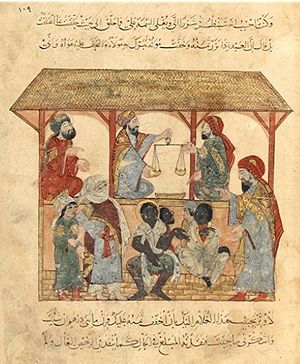
—So you joined a mosque at age fourteen—very unusual, very early. What was the demographic make-up of the mosque you joined?
—It was primarily African-Americans with some people of Middle-Eastern and Asian descent.
—I just read a Pew poll a few years ago that said that 59% of all converts to Islam in the US are African-American. So I’d like to ask you why you think so many African-Americans in the US convert to Islam?
—Some of the reasons that African-American convert are some of the same reasons that I converted, which I mentioned earlier, and many others who aren’t African-American. I do however believe that there are reasons unique to the African-American communities. Through experiences I’ve had, the people I’ve encountered and spoke with, and just from a lot of reading that I have done, I think Islam had been seen as a means for many African-Americans to re-connect with a piece of their culture that they feel they have lost through their ancestors being captured and enslaved and brought to the western hemisphere, and systematically being stripped of their traditions and identity.
It has been a way to strip themselves of the Eurocentrism that had been forced upon them. Christianity became synonymous with the oppression and persecution that Americans of African descent faced in the West.
—But wasn’t it Muslim slave traders who actually went into Africa and then enslaved Africans for sale to the Europeans and so on?
—Yes, what is known as the Arab slave trade begun in the seventh century, with the rise of the Islamic Empire and lasted well into the twentieth century in some places such as Saudi Arabia, Somalia, and the Sudan, where there are still reports of slave trading to this present day. The Arab Muslim slave trade reached a vast area including the Sub-Saharan east and west Africa, which was the major supplier, then there was central Asia, the Mediterranean region, Eastern Europe including the lands of the Slavic peoples.
There are even reports of the slave trade extending as far north as British Isles and Iceland. America at the time of its infancy fell victim to the Muslim traders to what was known as “Barbary States,” which were independent Islamic states that run along the coast of north Africa.
One thing I’d like to note is that in Islamic law it is not permissible to enslave free-born Muslims. Therefore only those born into slavery and non-Muslim captives are allowed to be taken as slaves. This could account for the fact that the vast majority of the people enslaved were those who inhabited the regions that bordered the territory of the Islamic empires and in particular the Christians were targeted.
—But we see radical Islamic groups now like ISIS regularly kidnapping and enslaving and selling women and others. Is this practice of enslavement approved of in the Quran and the Hadith?
—Yes it is. It’s not a very popular notion but I mean it definitely has been sanctioned by the Quran and Hadith. Groups such as ISIS look at the atrocities that they are committing as a holy war and as such any non-Muslim women captured become their property, even if these women are married. In the Quran such captives are frequently referred to as “ma malakat aymanukum” or “what your right hand possesses.” One such reference can be found in the Quran in Surah or chapter 4 verse 24, and it says, “And also forbidden are all married women except those whom your right hand possess. This is the law’s ordinance to you.”
What I just quoted is a part of a longer section that speaks about the women who are lawful for a man to have sexual relations with. In connection to these verses the Hadith, the tradition from the life of Mohammed that gives the reason or circumstances in which this verse was revealed, it says,
The apostle of Allah sent a military expedition to Awtas on the occasion of the battle of Hunain. They met their enemy and fought with them. They defeated them and took them captives. Some of the companions of the apostle of Allah were reluctant to have intercourse with the female captives in the presence of their husbands who were unbelievers. So Allah, the Exalted, sent down the Quranic verse, “And also are forbidden, all married women except those whom your right hands possess. This is the law’s ordinance to you.”
And then there is another example that can be found in the Quran, Surah 33 verse 50, where it is actually speaking through Mohammed himself personally. It says, “O Prophet, indeed we have made lawful to you your wives to whom you have given their due compensation and those whom your right hand possesses from what Allah has given of you of the captives …”
I can give many more examples but I think you can get an idea of how the Quran and Hadith sanction the actions of vices. Of course a Muslim may argue that these verses and Hadith I quoted were historical events specific to the time of Mohammed, but the problem with that reasoning is that Islam looks at the Quran as being the unchanging internal word of Allah. So if the entire Quran is the absolute perfect, infallible world of Allah directly dictated to Mohammed, how can it only be specific to a particular event or time?
—It is interesting to me in terms of African-Americans who comprised a very large percentage of those who convert to Islam in this country. There is also a very deep Afrocentric history of Christianity long before Islam, no?
—Yes there is. Christianity has had a very strong presence in Africa from the very beginnings of the Church. One even finds in the Gospel of Matthew that the Lord himself with his Holy Mother and St. Joseph fled to Egypt. There is the Ethiopian that St. Phillip encountered in the book of Acts. Alexandria is one of the ancient Holy Patriarchates. Then you have such great holy people such as St. Athanasius, St. Anthony of Egypt, St. Moses the Black, St. Mary of Egypt and Blessed Augustine of Hippo, just to name a few.
I feel it is a crime that so much of the rich history of Christianity in Africa has been forgotten and I’d even dare say intentionally discarded by Christians, particularly in the western churches.
—What are the differences, or the significant differences for example between the “Nation of Islam” and the teachings of people like Louis Farrakhan from what one would consider “orthodox” Islam?
—Well, there are too many to discuss in the time that we have but the most striking difference I would say would be the Nation of Islam’s belief that the black man is God while the white man was genetically created by a mad scientist named Yakub which is the Arabic name for Jacob who is said to have been born in Mecca and created a pale devil race “through scientific experimentation on the Greek island of Patmos” which we know from the New Testament. It is said that Yakub did this after he had a falling out with God. This one belief alone I feel is enough for anyone to determine that the Nation of Islam would not be welcome in the fold of orthodox Islam.
—So Nation of Islam followers are not really considered orthodox Muslims?
—No, they are not.
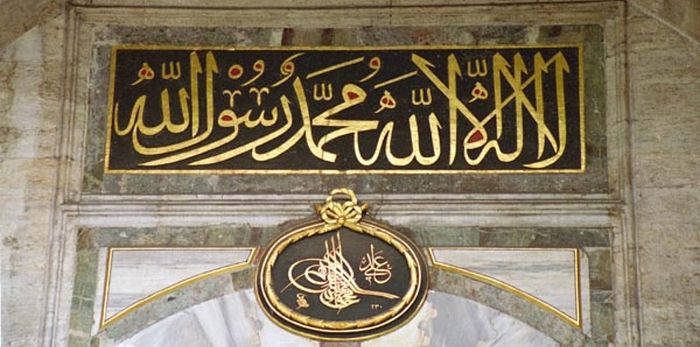
—Getting back to your story, what did it take for you to officially become a Muslim at the age of fourteen?
—Oh, it was very simple. The recitation of what is known the Shahada or the declaration that there is no God but Allah and Muhammed is his messenger.
—And that is all that’s repeated in the presence of Imams and other witnesses?
—Well the minimum would be two adult male witnesses and of course they would have to be Muslim.
—Where there other Caucasian non-African-American converts at the Mosque you attended?
—There were a few, one of which was one of the co-founders of a national Islamic organization that has gained a good amount of press in recent years. However, I was still pretty much a novelty at the time, especially due to my age and how I came into Islam, without any form of evangelization on the part of a Muslim.
There seemed to be more Caucasian women converting to Islam. From my observations this was due to, in a large part, to the marrying of Muslim men that emigrated here from other countries.
—And you strove to live a pious Muslim life, beginning at age fourteen. How strict were you and what practices did you follow?
—Yes, I was fourteen years old. I never looked at myself as being pious. Like you said, I did strive to be pious. I wanted to be closer to God. I would say that I was much stricter than the average cradle Muslim. This is not unusual however in many people who convert to a faith that they were not brought up in, are usually more zealous, at least for some time.
I wanted to immerse myself into Islam, learn all that I could. That is why I left my hometown at the age of eighteen and moved to another state, in order to study in an Islamic Madras, in other words an Islamic seminary.
I stayed there for about three years. I studied Arabic grammar, the Quran, the Hadith, Islamic jurisprudence and history. Besides that of course I prayed five times a day. I also said extra prayers that were encouraged but not obligatory. I fasted during the month of Ramadan and also fasted throughout the year, outside of Ramadan. I followed all the dietary laws, the laws of purification, abstaining from sexual relations outside of marriage, even to the point that I would not even shake a woman’s hand or look directly at her if she wasn’t related to me.
A huge part of a Muslim’s life is following what is known as the Sunnah. The Sunnah are the practices of Muhammed that encompass each and every aspect of a person’s life: how to eat, how to sleep, drink, dress, speak, use the restroom, even to the point of how a married man should punish his wife. I wholeheartedly practiced as much as I could.
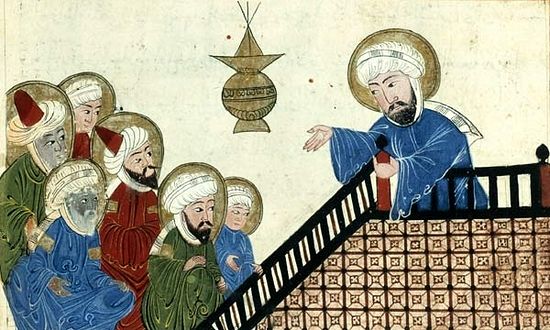
—George,
the Quran and Islam in general have many, what I would say and most
Christians would agree, misinterpretations of Orthodox Christianity.
What sort of heretical Christianity or heterodox Christianity was
Muhammed exposed to that he got these ideas, from your studies?
Pre-Islamic Arabia, particularly the area in which Muhammed was born, known as the Hijash, was predominantly pagan. There were however some Christian minorities in this region. There are some accounts recorded in the life of Muhammed where he encountered Christians. It is difficult to know how orthodox their beliefs were, but through examination of the Quran and Hadith and the misconceptions about Christianity contained in these sources, we can deduce that at least some of these people were heretical in their doctrines.
When Muhammed, for instance, was a youth he accompanied his uncle, by the name of Abu Talib, to Bosra which is in Syria. Here Muhammed met a Christian monk named Bahira. This Bahira noticed that wherever Muhammed would move a cloud would cover him. So, he called Muhammed over to him and gave him the news that he was chosen by God to be the last and final prophet.
The Islamic sources claim that Bahira had copies of the “original Gospels,” free from any errors or unadulterations, and in these Gospels there were prophecies foretelling the coming of Mohammed. This name Bahira has been linked in some writings to a monk named Sergius who some say was a Nestorian, others say he was an Arian. From what I know of Nestorianism and Arianism, I would lean more on the side that Muhammed was influenced by some form of Arianism due to Arianism’s view of Christ and its similarities with how Muslims perceive Him—not being divine.
We find in other accounts from the time of Mohammed, when he received his first revelation in a cave brought to him by the Archangel Gabriel, he was confused and scared so his wife Khadija brought him to her cousin. Her cousin’s name was Waraka who was a Christian, who some say was actually a Nestorian priest. The claim is that when he told Waraka about his experience, Mohammed was told that he was the final prophet foretold in the Scriptures. There are other accounts of Mohammed meeting Christians but all seem to have the same theme, that Christians confirm that he was the last and greatest prophet that was allegedly foretold, but due to the Christians and Jews changing their Scriptures, these prophecies speaking about Mohammed were removed or altered.
—According to Muslims obviously …
—Yes, according to Muslims, of course. One other long account even has the Byzantine Emperor Heraclius claiming that Mohammed was truly the long-awaited prophet and that all Christians should accept Islam. I think it would be interesting to mention that there are verses in the Quran that one could see were taken directly from the apocrypha. A very obvious example would be a passage from what is known as the “Infancy Gospel” of St Thomas where it says that when Christ was a boy, he took some clay and formed some birds out of it and breathed life in to them and they began to make noise and fly. If you compare this with a portion of chapter 5 verse 110 from the Quran, it says, “Remember O Jesus, when you designed from clay, what was like the form of a bird with my permission then you breathed into it and it became a bird with my permission.”
—Which is very similar to the quote in the apocryphal or non-deuterocanonical canon of St. Thomas. Good point.
I read, in doing some research for this interview, that among the fourth century heretics, there was one particular Arabian sect known as the Collyridians who were known for their worship of Mary as a goddess and some Muslims feel that this is in fact the sect which the Quran is addressing because the Quran speaks of the Holy Trinity as being the Father, Son and Mary.
—Yes, there is an interesting tradition found that could very well have a connection to the Collyridians. In the last few years of Mohammed’s life, when he returned triumphantly to Mecca, in what is known as the “Conquest of Mecca,” one of the first acts he performed was to cleanse the Kaaba of its hundreds of idols that were to be found inside and outside of it. It is reported that when Mohammed entered the Kaaba he immediately had all of the idols thrown out and all images effaced—all except an image of Christ with the Theotokos surrounded by angels. It is said he even went as far as stretching his arms out over the image so as to emphasize his order to leave it be. It is further reported that he finally had this image removed with some reluctance, so the ideal of an icon of Christ and the Theotokos in a pagan-era temple could definitely suggest the presence of a group such as the Collyridians.
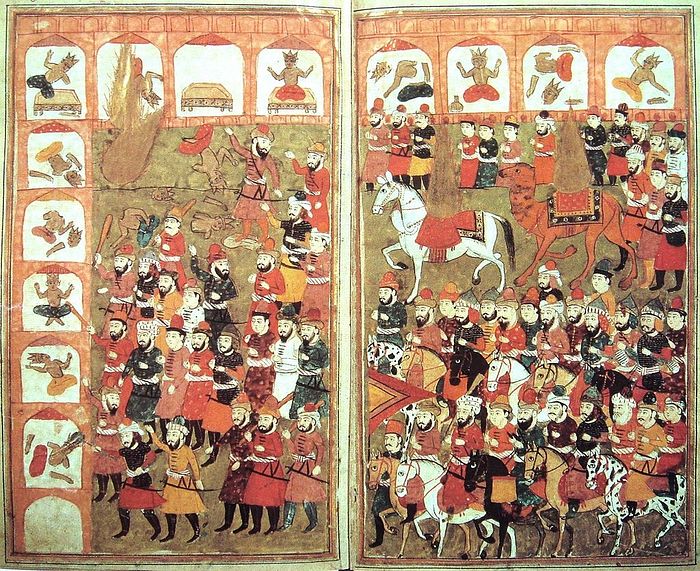
—It’s true, is it not, that Mohammed mistakenly thought that the Christians worshipped three Gods, known as Tritheism—the Father, the mother Mary and the son Jesus, rather than one God and Three Persons—which of course Orthodox Christianity rejects.
—Yes, I would say that is very true. In one of the biographies of Mohammed, it mentions the arrival of a delegation of Arab Christians that came to speak with Mohammed. The account speaks about how the Christians were debating about the nature of Christ and then it goes on to say, “they argue that He is third of the Three in that God says, ‘We have done, We have commanded, We have created, and We have decreed,’ and they say, ‘if He were One he would have said, I have done, I have created and so on,’ but He is He, that is God and Jesus and Mary.”
Concerning all these assertions, the verse from the Quran that is connected to this tradition can be found in Surah 5 verse 73. “They have certainly disbelieved who say, ‘Allah is the third of three.’”
—Similarly, and correct me where I am wrong, George, the Quran rejects the Fatherhood of God and the Sonship of God the Son, which in Islamic understanding is that Christians believe, God had physical relations with Mary to give birth to Jesus, which of course is absolutely not Christian doctrine.
—Yes, it says in the Quran, chapter 19 verse 88, in reference to that, “The most gracious had taken a son.”
This misconception could have come from the fact that the polytheists in Arabia actually believed that the angels and even some of their false idols were the offspring of God through some physical intercourse, and so Mohammed I think only could understand the term “Son of God” through the human concept of sexual reproduction, which also led many Muslims to think that Christians believe that God begat a son in the same manner as when a human father begets a son.
This of course is completely ridiculous and blasphemous from not only the Islamic perspective but of course the Christian one also.
—Right. Muslims also deny that Jesus died on the cross. I picked this up in Surah 4 verse 157, in line with the absence of the conception of sacrifice. So the Quran never speaks of the atonement or the saving work of Jesus. Is that true?
—Yes, that’s very true. The verse that you mentioned speaks about the Islamic belief that Christ was never crucified and that it was only made to appear so. I would like to note that some Muslim commentators claim that God actually changed Judas Iscariot’s appearance to look like Christ and that Judas was the one on the cross.
The Quran never speaks of the atonement or saving work of Christ because they deny Christ being the Son of God. Since Islam rejects Christ’s divinity it also negates the whole purpose of his Incarnation and in turn our salvation through Him. They Islamic formula for salvation consists in proclaiming the Suhadda and doing the works and that’s it.
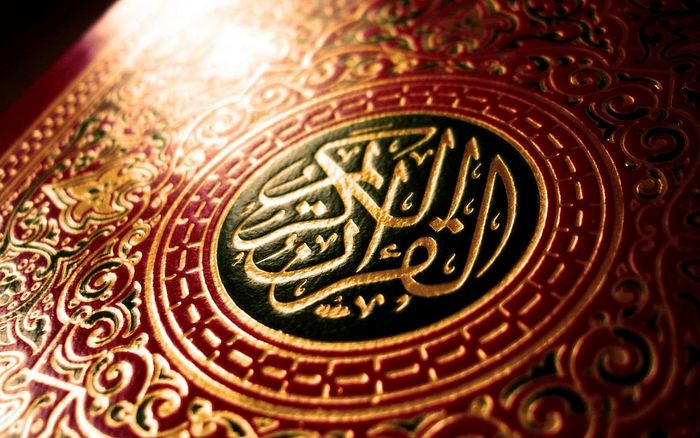
—As you know, love is at the heart of Christianity, and you mentioned to me that there is not a real teaching in Islam of divine love and mercy from God towards mankind, or a real teaching of true communion or union with God in Islam, and that it’s mostly about, as you put it, “a slave-master and slave relationship,” quoting yourself. Please explain what you mean.
—In order to gain some understanding of how a Muslim will most likely see his or her relationship with God, first I think it is important to have an idea of why man was created according to Islam.
In the Quran Surah 51 verse 56 it says, “I did not create Jinn,” which are unseen spirits, “and man except to worship me.” Again in Surah 11 verse 7 it says, “and it is he who has created the heavens and the earth in six days and his throne is on the water, that he might try you, which of you is the best in deeds.”
I think these two verses demonstrate the general reason why man was created. First, to fulfill some need that God had, to be worshipped according to Islam, and second, to participate in a contest of sorts in order to see who performs the most good deeds. These two concepts are very common themes all throughout the Quran and Hadith. So for time’s sake the purpose of man’s creation, according to Islam, can be broken down in this way: to fulfill God’s need for worship and to appease him and second for man to prove he is worthy of God’s mercy, and if he does that he will be rewarded. All of this I found is in stark contrast to the Orthodox Christian’s view of the purpose of man’s creation and the purpose of man’s life and that is communion with God and to share in his love and to become by Grace what God is by nature.
—You also said that the God or Allah of Islam you would actually describe as a tyrant.
—Yes, it’s difficult to fully explain in a limited amount of time but I will do my best to touch on some of what I mean.
According to the Quran, Allah guides whom he wills and he leads astray whom he wills, which is a quote from the Quran. This phrase is repeated countless times. Next I’d like to quote a well-known saying of Mohammed that says the following, “It was said to Allah’s messenger, ‘has there been drawn a distinction between the people of Paradise and the inhabitants of Hell?’ He said yes, it was again said, ‘If it is so, then what is the use of doing good deeds?’ Whereupon Mohammed said, ‘Everyone is facilitated in what is been created for him.’”
Another lengthy saying speaks about when a child is formed in his or her mother’s womb and an angel is sent down to record on a scroll every aspect of this person’s life, including whether they will be good or bad, happy or unhappy, and whether they will be amongst the inhabitants of Paradise or Hell. The saying ends with the words, “then his document of destiny is rolled up and there is no addition to nor subtraction from it,” and that is the end of the sayings of Mohammed.
I think these last two quotes speak about the fatalistic aspects of Islam. Then we can go on to Surah 7 verse 179 which says, “Surely we have created many of the Jinn and mankind for Hell.” So from this verse we can see that there are those amongst mankind that are actually, specifically, created for Hell. This is why is it mentioned in the Quran in multiples places, that the fuel of Hell is, “men in stones.” From all that I quoted I came to the conclusion that in Islam we are not dealing with a just God. Instead it teaches that the Creator fashioned everything almost like a machine, fixed in its ways even to the point that God Himself couldn’t or wouldn’t diverge from the path in which the system He created has set.
Everything is locked into a sort of destiny, even to the point that actions that we perceive as being the product of our own free will, had in fact already been written for us. So according to Islam, mankind is basically given the illusion of having free will, when in reality we don’t have one at all. So any notions of love and mercy from such a God can be perceived as superficial at best and can be quickly voided and nullified.
—Not to get into a long discussion on aspects of Christian theology but some of what you just said sounds a little bit like the teaching of John Calvin and Calvinism on double predestination and so on.
You also mentioned to me that there were very different ideas of love and mercy in Islam from that that which you learned in Orthodox Christianity. Maybe you could explain a bit about that.
—Yes, one such difference can be expressed by asking you or any other Christian, at least one who knows the Scriptures, if God love sinners or non-Christians. The answer would most likely be “yes, of course.” Then a Christian could quote countless verses such as Romans 5:8 which says,
“God demonstrates his own love towards us in that while we were still sinners, Christ died for us.”And then in the Gospel of John, chapter 13 verses 34-35 it says,
“A new commandment I give to you, that you love one another as I loved you, that you also love one another.”I am quite aware that the concept of Christian love has not always been put into practice through the ages including our time, and this is something we will have to account for, however I am speaking about Scriptural differences between Christianity and Islam.
So, let me quote from the Quran Surah 2 verse 276 where it says, “and Allah does not love any sinning disbeliever.” And then you have Surah 3 verse 32 where it says, “obey Allah and his messenger Mohammed, but if they turn away then indeed Allah does not love the unbelievers.” Then you have Surah 3 verse 31 where it says, “say O Mohammed, if you love Allah, then follow me. So that Allah will love you and forgive you your sins.” So we can see that love in Christianity according to the Scriptures is a real love, an unconditional love, a truly divine love, which any average Muslim would scoff at, just as I did at one time. Islam only sees love as being conditional. In Islam Allah has 99 names or attributes, one of which is “the one who is loving” but in the Bible, through the Holy Spirit, we are told that God is love and it is out of His infinite love that He created us and He’s redeemed us through His Son and has given us the ability through His Grace to be His sons through adoption and to call Him Father.
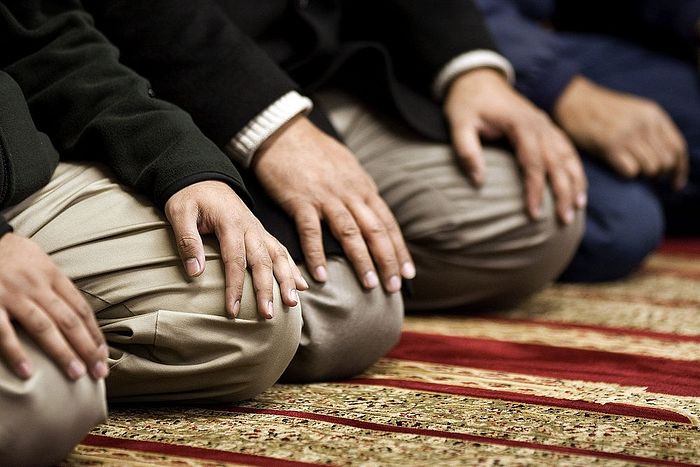
—Yes, so there is a very different spirituality and ethos obviously in Islam and Christianity, and this will end part one. Thank you, George, for this fascinating first part of your journey from Islam to Orthodox Christianity.
—Thank you, Kevin.
Part 2
—In this program we’re presenting part two of the fascinating interview with “George,” a recent convert to Eastern Orthodox Christianity from Islam to which he converted at the age of fourteen and went on to study Islamic history, theology and jurisprudence with the goal of becoming an imam. In this interview we’ll discuss George’s personal journey from Islam to the Orthodox Church. Welcome back, George. It’s great to have you on Ancient Faith Today.
—Thank you Kevin, again, it’s a great blessing to be here.
—So, picking up from where we ended in our first part, would it be fair to say that in your experience Islam is not really an experiential faith tradition, but mostly about following their prayer rules, fasting disciplines and their jurisprudence or Sharia and just obedience in general?
—Yes, I would definitely agree with that. There are some teachings that can be found within Islam, what’s known as Sufism, that speak about experiencing a union with God, however many of these ideas taught in Sufism as compared with the traditional orthodox teachings of Islam, are questionable at best and other teachings are outright heretical and even blasphemous.
Since in Islam there is no real concept of God dwelling in His creation through his Holy Spirit, to experience God in a real sense is impossible. In fact when the Quran does speak of God being close to His creation, it always means this in a metaphorical sense. A good example of this would be in chapter 50 verse 16 where it says, “… and we are closer to him than his jugular vein.”
This idea is only meant that God is close by his knowledge or through his knowledge and in no way it means any real presence, that God is close to His creation. Even to say something like, “God is everywhere,” has been very controversial topic in Islamic theology throughout the centuries. So much so that to say such a thing must always be qualified by the phrase, such as, “He is everywhere only through his knowledge but God is established upon His throne.”
—But having said all of this, were there positive aspects of Islam in your life as you were practicing Islam?
—Yes, I believe that Islam did give me much needed direction in my life, as it has and still does for many people. Anyone can hardly argue that having a life centered around one’s Creator and performing acts of prayer, fasting, charity, etc, are a bad thing in and of itself. Especially when we compare such a life with the alternative that so much of the world around us partakes in—life completely devoid of any God consciousness or any sense of a higher morality.
The problem I see, though, is that Islam stunts a person’s spiritual growth. Without acknowledging, believing and confessing God as He truly manifested Himself as, that is, through the Holy Trinity, a Muslim actually restricts God and in fact creates an idol of sorts, and in turn this restriction or limiting of God, carries over into a Muslim’s life and their view of themselves in others. I think a person’s view of God definitely can affect his or her life and their worldview.
—I want to follow up with this, because you mentioned Islam not being experiential. So, would you say looking back over your life as a Muslim that there was no experience of God for you in Islam?
—There was not so much an experience of God for me, as there was an acknowledgement of Him. I acknowledged that God existed, that I should believe and worship Him, but like I said recently, my concept of God as a Muslim did not allow me to experience Him.
I see it like this. The God of Israel was not fully realized until the Incarnation of the Word of God, that is Jesus Christ, which was the greatest and most profound giant step forward and I would say the biggest game changer in the history of mankind.
Then about six centuries later you have Mohammed, who turned back the clock, so to speak, and by rejecting the Incarnation and the salvific acts of the Lord Jesus Christ, Mohammed in effect returned mankind back under the Law and robbed those who followed him of the truth about God, as revealed through his only begotten Son and His Holy Spirit.
—You said something interesting to me. You said that although you’ve followed the external rubrics of Islam, you still often felt like a “monster” inside. Please explain.
—Yes I did. One thing that must be understood is that the external practices of Islam are so greatly stressed that this usually will lead a person to neglect and even look past the need for real spiritual development and growth. This lack of spiritual growth then effects how we deal with those around us. This is what happened to me, and I have seen this happen to countless others.
I had such a deep sense of satisfaction in myself, through my practices of the rituals and laws of Islam, that this created a deep sense of what I would call “pharisaism” and after time this made such an effect on me that I began to look down upon anyone who was not Muslim, even those who had loved me and cared for me during my whole life. This in turn transformed me into a monster, I think.
—Maybe you can expand just a bit on what you mentioned, that Islam creates a sense of pharisaism, that is, a judgmental and critical attitude in true believers rather than love.
—Certainly it can and has in many instances that I have personally seen, beginning with myself. The Quran states in Surah 5 verse 51 it says, “All you who believe do not take the Jews and Christians as friends and allies. They are in fact friends of one another and whoever is an ally to them among you then indeed he is one of them.”
Verses such as this one can cause people to take on an “us versus them” attitude which turns into, I would say, a fanatical zeal to stay on the right path—through the “straight path” which is what is called in Islam—and this turns into a general feeling of distrust, paranoia and contempt for non-Muslims in general and even towards other Muslims.

Jihida John—a Briton who took part in ISIS executions
—Speaking of peace, as you are well aware, some people speak of Islam as religion of peace and jihad as strictly as spiritual struggle, and groups like Al-Qaida and ISIS are in fact hijacking the religion—we hear a lot about this. What did you hear about jihad and the teachings of the Quran in this regard behind the scenes?
—First off, literally the word “jihad” does mean “a struggle” in the generic sense of the term. It can mean a military struggle as well as a spiritual one. However most often when jihad is mentioned in Islam it is speaking of a military struggle or as it is called in Arabic, “qital.”
I don’t believe however that the groups you mentioned are simply hijacking the religion of Islam. There is text after text supporting their actions that cannot just be explained away, as some people attempt to do by claiming that those particular texts are speaking about specific historical events that have no relevance in a Muslim’s life today. This idea however poses a doctrinal problem for anyone who believes in the absolute divine and eternal nature of the Quran.
Behind the scenes I would say many Muslims I encountered seemed almost indifferent towards the so-called hijackers of Islam. Many of them will neither condone the actions of the terrorists, nor will they outright condemn them either. Rarely do I even see any public condemnation of the terrorists by Muslims. Even if the lack of empathy shown by Muslims is brought up, they will get very defensive and evoke such events as the Crusades, as an example, to somehow justify the actions of a terror group.
As a bit of a side note, I think it is very strange that we still have Christians apologizing for the Crusades, including the late Pope John Paul II. Yet, how often do we see any public condemnation by Muslims of the horrific acts done in the name of Islam? To this day, for example, the Turkish government denies the Armenian genocide and a country such as Saudi Arabia, the center and birth place of Wahhabism, has been cited for one human rights violation after another and nothing is done about it.
—George, would you say that the so-called radical terrorist practices of these groups that we are hearing so much about are those of selective extremists or is this what you heard was the norm in Islamic teaching? Will you talk a little bit about that?
—Given the vast amounts of material available in Islam condoning violence against non-Muslims, and then add to that the historical reality which shows that Islam from its very beginning has used force and terror to spread its faith, I do not know how anyone could come away with any other conclusion other than this is the norm and not the exception.
I would even go so far as to say that, to better understand Islam and its teachings one should not look at it so much as a religion but rather as a political movement heavily influenced by the pagan and Beduin culture of Mohammed’s time with Judeo-Christian undertones to give it some sort of an Arab legitimacy.

—As well as we’ve discussed, along with many misunderstandings that came from heretical versions of Christianity.
Moving on with your conversion experience, which I know our listeners are going to be very interested in, you told me your mother died at the early age of fifty, may her memory be eternal, when you were still a young man. So how did this event affect your relationship to Islam?
—Well, it shook me as anyone could imagine. It forced me to ask myself some very difficult questions. Islamic teaching is pretty cut and dry when it comes to the fate of non-Muslims when they die. The very thought that my mother, who loved God, was one of the most loving, generous, and kind people I’ve ever known, was going to be condemned to eternal damnation just because she wasn’t Muslim terrified me.
What occurred in the weeks that followed my mother’s death was just as unnerving for me. I remember the day she passed away. That evening I went to a mosque to pray, to reflect, to find some comfort. There I met some of my brothers in faith and told them what it happened. Instead of their condolences, the first thing that they asked me was if my mother embraced Islam. When I said, “No she didn’t,” the general response was, “Oh, I’m sorry to hear that. Well it wasn’t the will of Allah, I guess.”
I felt disgusted to say the least, but I knew that this is what Islam teaches, so how can I argue with it? I can only try to tell myself that there must be something wrong with me to question Islam. I fought against such thoughts but they still remained no matter how hard I tried to remove them.
—So you began to drift from Islam and religion in general?
—Yes, it wasn’t like I woke up one day and said “Forget all of this” and gave up practicing Islam entirely and renounced it. It was a very gradual process which took years.
For such a long time, I only saw life through the lens of Islam. I wholeheartedly devoted myself to its teachings and its concept of God. I even went so far as to pray at times that I would rather have my life taken from me than to die a non-Muslim.
So going from this to actually despising Islam, had such a huge effect on my mind and soul, both of which I felt I was losing. I was giving up everything that had defined me. I had not only been a practicing Muslim, but I had spent years studying to be an imam, or an Islamic cleric. I taught Islam, I preached it, I invited others to it and now, I was turning my back on it. So in the end I was left with a very bitter taste in my mouth, not only for Islam but for religion, period.
—And what happened? Did things, as you mentioned, start to get dark?
—Yes it did. I was left with a huge void in my life. I had spent so much of my time searching for God, thought I had found Him, only to come to the conclusion that I was wrong. I felt mentally and spiritually exhausted. I actually felt betrayed by God as I saw Him. I was heartbroken. I felt nothing but darkness inside. I still held on to a very superficial belief in a higher power but my belief in a real and personal God was seriously damaged. And I had no idea on how to mend this damage, and to be quite honest, I didn’t even know if I cared at that point.
—So it’s fair to say that you were having a very serious crisis of faith.
—Oh, yes I did.
—Why do you think that was?
—Well, after the events of my mother’s death, 9/11 and its aftermath and my many personal struggles with Islam and just with life in general, I began to look at the world with grown-up eyes. St. Paul says in 1 Corinthians When I was a child I spoke as a child, I understood as a child, I thought as a child, but when I became a man I put away childish things.”
In a manner of speaking, I had outgrown Islam, its rituals, its laws, its very concept of God. I felt that all of the structure and discipline in the world is meaningless if it doesn’t lead to an end, and I realized I didn’t even have a clue what that end was.
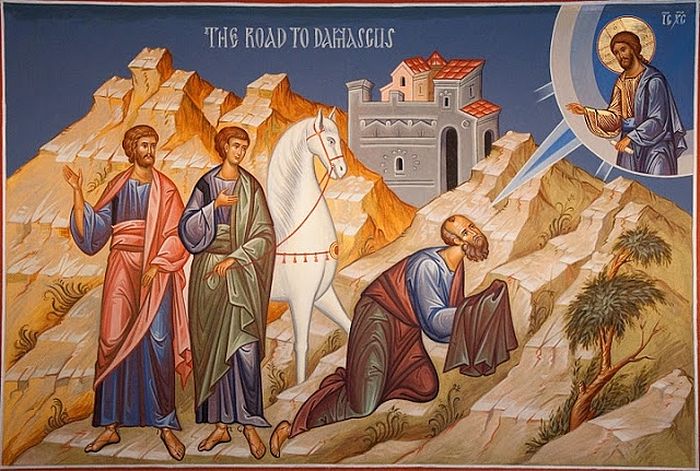
—Tell us about what was going inside of you and how you were drawn to Jesus Christ.
—I was stuck in a sort of limbo I would say. Spiritually I felt dead inside. My personal life was full of hate and inexpressible anger. I hadn’t prayed in I don’t know how long and I felt if I did, what was the point? What could I say, how would I go about it and was there even anyone listening?
I began reading books on philosophy as I had years before when I was in my early teens, trying to make some sense of everything and trying to come up with my own answers. Then I had a dream one night, and I’d just like to note that I didn’t put a lot of stock in dreams and visions and that sort of thing. I’ve always been more of someone who doesn’t go by his feelings or by his heart but more by his mind.
But one night I had a dream in which I felt the presence of Christ. I didn’t see Him as such, just felt that He was there. It was as if He wanted me to come to Him but I had kept pushing Him away, denying Him, and then I heard weeping. When I woke up I had no idea what to make of it. I had never been a person who put any great value on dreams or visions like I said, or thought of myself as important enough to have any remarkable spiritual experiences.
At first I just dismissed it as a strange dream, nothing else. Then sometime after that I was outside walking somewhere when out of nowhere I began reciting the Lord’s Prayer. The really odd thing is that I never memorized it, let alone ever recited it. Then one day, while I was at home, I felt this huge weight overcome me that I could physically feel, actually feel pushing me down. I just began to cry like I hadn’t cried in years. I fell down on my knees at the edge of my bed and buried my face into my hands. I didn’t know what to do or say, something just came over me and the only words that came out were, “Jesus Christ, if You are there, please help me.”
After that event, some months later, I had a dream of St. Paul the Apostle. I saw him on his way to Damascus as it’s narrated in the book of Acts and then I saw St. Paul fall to the ground. I looked at his face but instead of seeing St. Paul’s face I actually saw my own. It was then that I knew all of this wasn’t just some sort of coincidence. I felt I had to do something even though my mind told me to reason away everything and make rational sense of it all. Something deeper inside was saying to me, “Tell your mind to shut up and just listen to your heart for once in your life.”
—George, tell us about what first made you aware of Eastern Orthodox Christianity and what drew you to Orthodoxy after having rejected Christianity as a child and being in an anti-Christian religion for over twenty years.
—After everything I had experienced I still had the problem of not knowing what to do next. I didn’t know where to turn, I wasn’t interested in one of the thousands of Christian denominations and I wasn’t looking for just an emotional experience either. I needed something tangible as well.
I remember being at the state fair where I lived with my then girlfriend who is now my wife, who I must say has been an incredible example for me of what Christian love, patience, kindness and understanding can and should be. We stopped by a Christian outreach tent that was giving out Bibles. I went over there, told them my background, they gave me a Bible—the first of which I ever owned in my life—and then they asked me if I would like to recite what I later found out was called the “Sinner’s Prayer.” The people were nice enough but it just didn’t feel right. Something inside told me to keep searching. I kept wondering if there were any remnants of the historic Church that I began to learn about from my reading of the New Testament.
All of the denominations around me claimed to be “The” Church. Having been a Muslim I knew the value of religious tradition and historical continuity and I just didn’t see it in any of these denominations.
The Roman Catholic Church was the only one that seemed to have any real connection to the Apostles and to the original Christian community. However I had many issues with the Catholic Church that I just never could come to terms with.
One day I was searching the web and started putting in keywords such as ancient, Christian, Church, first Christians. I searched the list of results and one that caught my eye right away was a particular jurisdiction’s website. On the website was the quote from Acts 11:26 which says
and the disciples where first called Christians in Antioch.From this I saw a connection between a historical community of believers in Christ and an actual place. I was intrigued and I wanted to know what this Church believed, its connection to the first Christians and its manner of worship. I began reading more about the Orthodox Church, its teachings, practices and history. Then I told myself that this is what Christianity was meant to be and I’ve said it many times since then, that I wish I would have known about this Church a long time ago.
The more I learned the more everything seemed to click. I would have to say that one of the main features of the Orthodox faith that truly drew me was the concept of “theosis,” and it being a main focal point of a Christian’s life. I then contacted the priest at my local Orthodox church, met with him, and after about year I became a catechumen. Also I must say that Ancient Faith Radio was and has been a Godsend which I came to know about when one day I was searching for stories of ex-Muslims who became Christian and I actually came across an interview that you had done with a former Shiite Muslim who converted to the Orthodox Church.
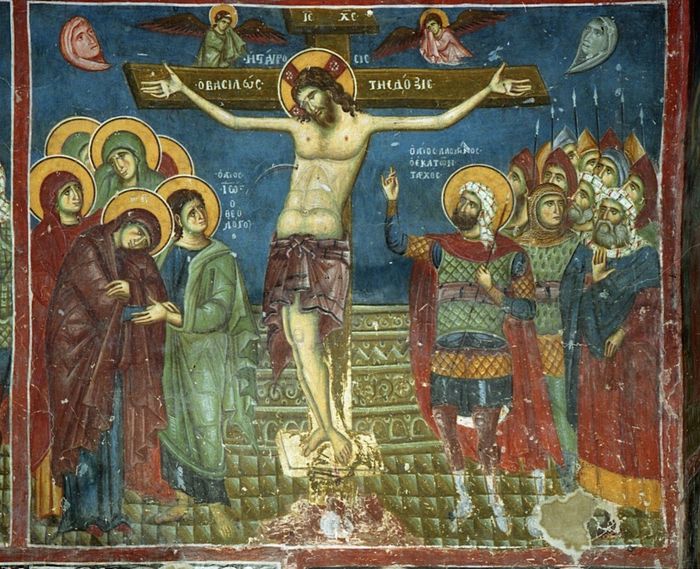
—Right, Anthony Devar. So it was a spiritual experience of the person of Christ that drew you to Him or was it both that and your intellectual search?
—It was a combination of both, but the spiritual experience was definitely the more overwhelming of the two in my conversion to Christianity, unlike when I converted to Islam.
Throughout my life I have always been the type of person who has a tendency to overthink and over-rationalize things, even spiritual matters, which can be detrimental to someone in search of God, I feel. This has proven to be a real obstacle for me. Believing in God cannot just be some sort of mental exercise.
One day, about a year ago, something occurred to me while looking at an icon of the Crucifixion of Christ. I was sitting at home, staring at this icon of the Lord’s Crucifixion. I found myself fixed on the posture of his arms stretched out. Something just hit me then. I didn’t see this posture as one of pain and suffering. I am not downplaying in the least the horrific pain and sorrow surrounding this event, but at that moment I saw so much more than that. I saw something so beautiful, as if Christ was telling me, “I did this for you, and the whole world, because I love you and I want you to come to Me and follow Me.” This feeling just came over me. Something like when I was a child and I would hurt myself and then my mother would hear my cries and come rushing towards me, and I would see her with her arms stretched out and then she would embrace me, and then this feeling of calm, love and safety would just overcome me.
—I forgot to ask you this before, but Islam also rejects the Holy Spirit as God. Is that right?
—Yes it does. In fact the Holy Spirit is referred to in the Quran but when it mentions the Holy Spirit it is actually referring to the Archangel Gabriel. This is the Islamic belief of what the Holy Spirit is.
—Did you struggle with the Christian but anti-Islamic doctrines of the Holy Trinity, Christ being the unbegotten Son of God, and the Holy Spirit being God?
—Yes I definitely had my struggles. I cannot overstate the transformation that I’ve had to undergo, of my mind, soul, the very essence of who I am and the way I see everything.
Islam has at its core the rejection of everything that the Christian faith holds as fundamental. The most profound example of this is Islam’s rejection of the Lord’s divinity and his Crucifixion. Even the name of Jesus Christ used in the Quran is different than the one that had been used by Arabic speaking Christians for centuries before Islam.
The matter regarding what Muslims call Christ and what Christians have called Him may seem trivial to some but I feel it speaks to a much more important point, that the Christ found in Islam and the one that we know as the Lord and Savior of the world are in fact not the same individual.
So now when I hear a Muslim say that they believe in Jesus Christ, I would have to say, “No you don’t.” There is only one Jesus Christ, not a Muslim one and a Christian one, and if a person does not accept and believe in Him, to be Who He truly is, then they do not believe in Christ at all and have only fashioned some new individual as Islam has done.
As I struggled I found that the more I read, studied, participated in the Divine Liturgy, and prayed, that so much became clearer to me. I realized that I didn’t have to, nor would I ever be able to understand everything, and that essentially God the Holy Trinity is a mystery, and I had to just accept that and believe and follow the guidance of the Church. I mean, that’s what faith is.
I have to say that two books that have been extremely helpful in my experience are On the Incarnation by St. Athanasius and The Exact Exposition of the Orthodox Faith written by St. John of Damascus. Overall I learned and, just as important, have experienced how wonderful, glorious and beautiful God, as the Holy Trinity, really is.
St. John of Damascus, icon from here
—Beautiful. George, as we are starting to come to the close, tell about your experience of Orthodox Christian worship and compare it to your experience of Muslim worship.
—I’d first say that nothing could have prepared me for the first time I attended the Divine Liturgy. All of my senses were engaged at the same time. It was quite overwhelming. I felt like a child. It was like nothing I have ever experienced in Islam.
There is really no comparison. I didn’t feel like I was just participating in the worship of God, but I felt that it was a mutual participation. The people singing and praising God and in turn God working with and through the people, if that makes any sense. It didn’t feel stagnant. There was this kind of indescribable flow to it all.
The external aspects of Orthodox Christian worship were not at all strange to me though, such as the bowing and prostrating. It did take some time for me to become comfortable with the use of icons, especially coming from such an iconoclastic background, but then I read On the Holy Images, again written by St John of Damascus. The way he defends the use of icons blew me away and after that I had no more doubts about how icons are not just religious art but an important component of the doctrine of the Incarnation of the Son of God.
—Yes it’s a very important book, and I am so glad you read the early patristic writers and not just interpretations of Orthodoxy. That’s so important.
Has your experience as a Christian, an Eastern Orthodox Christian, changed you and how would you describe that change?
—Well, it’s changed me in such a profound way I feel, and it’s not only changed me, but it’s an ongoing process. I can spend an entire show just speaking on this one question. I don’t feel I have even begun to understand the real significance of dying, being buried and resurrected with Christ. I know now that my life must be centered in dying to my old self, my old thought process, my old outlook on life, the way I see myself and others and how I deal with my neighbor.
It has been a wonderful life-changing experience, and to be honest, one of the most terrifying at the same time. Being baptized into Christ has been like having a mirror placed before me. It’s forced me to look at myself honestly with all of my sins and shortcomings. There is no deceiving God and I am learning that to have a real relationship with Him means I have to honest with myself first, before I can offer myself to God.
For the first time in my life I know what love truly is, and I know that sounds very clichéd but as the Lord says, Greater love has no one than this, than to lay down one’s life for his friends.” There is no greater love than to lay down one’s life, a husband for his wife, a wife for her husband, a parent for their child, anyone for that matter, and to die and empty ourselves for the sake of others is a truly divine act which Christ did for all of us first and foremost. This is definitely real love. By God’s Grace may I and each and every one of us put it into practice.
—George, thank you so much for sharing your amazing story and our prayers will be with you.
—Thank you very much Kevin and God bless you all.
Please, see also
Journey to Orthodoxy / Islam
Fr. Zakarias Boutros on 44 Contradictions in the Koran
The Strange Teachings of Muhammed
Islam (tag)
Islam (tag in the other our blog)
Fr Daniel Sysoev, the saint missionary & martys (from here)
Fr. Daniel Sysoev: “To Make the Whole World Love Christ”
Many Muslims Baptized After the Death of Fr. Daniel Sisoev


Δεν υπάρχουν σχόλια:
Δημοσίευση σχολίου